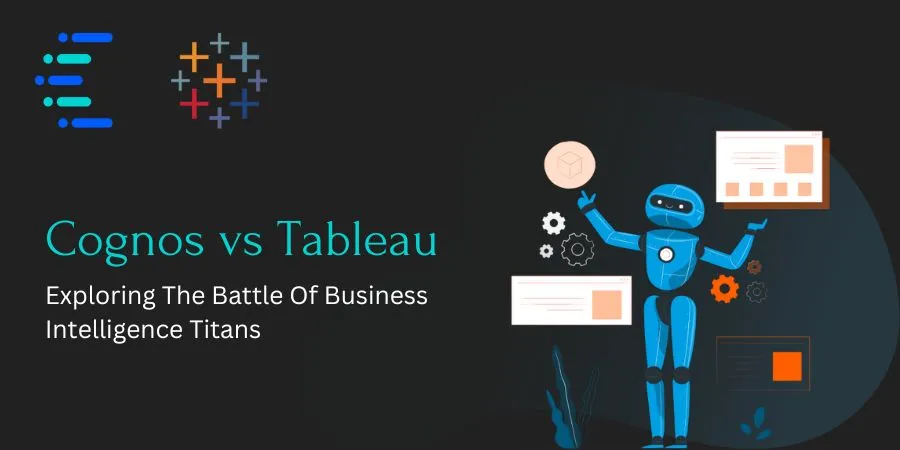
Firms rely heavily on powerful tools and platforms to extract insights and make informed decisions. Two prominent players in the field of BI are Cognos and Tableau. These industry-leading platforms offer robust features, visualization capabilities, and data analysis tools that help firms unleash the true potential of their data.
Understanding Cognos
Cognos is a comprehensive BI platform that empowers firms to access, analyze, and present data. It offers a distinct range of functionalities, including ad hoc querying, report generation, data visualization, and performance management.
Cognos provides a centralized and unified environment for managing data assets, making it suitable for large enterprises with complex data requirements. Its powerful reporting capabilities, robust security features, and scalability make it an ideal option for firms seeking enterprise-level BI solutions.
Key Features OfCognos
Report Authoring: Cognos permits users to construct highly customized reports and dashboards, enabling them to effortlessly extract valuable insights from data. It offers a drag-and-drop interface, advanced formatting options, and the ability to incorporate distinct data visualizations.
Data Integration: The platform supports seamless integration with distinct data sources, including structured and unstructured data, databases, spreadsheets, and cloud-based systems. Cognos provides connectors to prominent databases, permitting users to access and combine data from multiple sources.
Collaboration And Sharing: Cognos facilitates collaboration among team members by providing a centralized repository for sharing reports, annotations, and insights. It permits users to schedule and distribute reports automatically to stakeholders, ensuring timely and accurate information dissemination.
Advanced Analytics: With built-in advanced analytics capabilities, Cognos enables firms to perform complex data modeling, predictive analytics, and scenario planning. It offers statistical functions, data mining algorithms, and machine learning integration to uncover patterns, correlations, and trends in data.
Security And Governance: Cognos places a strong emphasis on data security and governance. It offers role-based access control, data encryption, and auditing features to ensure data confidentiality, integrity, and compliance with regulatory standards. The platform also provides robust versioning and change management capabilities for maintaining data accuracy and consistency.
Exploring Tableau
Tableau, on the other hand, is a leading data visualization and analytics platform known for its intuitive user interface and interactive visualizations. It empowers users to explore and comprehend data through visually appealing charts, graphs, and dashboards. Tableau's strength lies in its simplicity and ease of use, making it prominent among business users, data analysts, and even non-technical stakeholders.
Key Features Of Tableau
Interactive Visualizations: Tableau's drag-and-drop interface permits users to construct stunning visualizations without the need for coding or complex data modeling. This feature makes data exploration and analysis accessible to users at all levels of technical expertise. Users can choose from a variety of charts, maps, and graphs to present their data in a visually engaging manner.
Data Connectivity: Tableau seamlessly connects to a distinct range of data sources, including spreadsheets, databases, cloud services, and big data platforms, enabling users to analyze data from multiple sources in a unified view. It offers native connectors to renowned databases, as well as connectors to cloud platforms.
Real-Time Collaboration: Tableau facilitates real-time collaboration among team members, permitting them to share insights, dashboards, and reports across the firm. It provides the ability to publish and share dashboards online, permitting stakeholders to access and interact with data from anywhere, fostering a data-driven culture.
Embedded Analytics: Tableau development Company offers embedded analytics capabilities, permitting firms to integrate interactive dashboards and visualizations into their existing applications, products, or websites. It permits users to consume data insights within their familiar workflows, enhancing user adoption and engagement.
Mobile Accessibility: With mobile-ready dashboards and responsive design, Tableau ensures that users can access and interact with data on the go. It provides a native mobile app for iOS and Android devices, permitting users to view and analyze data anytime and anywhere. This feature empowers decision-makers to stay informed and make data-driven decisions even when they are away from their desks.
Comparing Pros And Cons
Both Cognos and Tableau excel in different areas, catering to diverse business needs. Cognos provides a comprehensive and robust BI platform suitable for large enterprises with complex data environments.
Cognos's report authoring capabilities permit deep customization and control over report layouts, formatting, and data visualization options. However, Cognos may require more technical expertise and time for implementation and customization, making it better suited for firms with dedicated IT teams and a focus on enterprise-wide analytics and reporting.
Tableau, on the other hand, is renowned for its user-friendly interface and powerful visualization capabilities. Its drag-and-drop functionality and intuitive design enable users to construct visually appealing dashboards and interactive visualizations with ease.
Tableau's emphasis on self-service analytics empowers business users and data analysts to explore data independently, reducing reliance on IT departments. While Tableau offers advanced analytics features, it may have limitations when dealing with complex data modeling or handling large datasets.
Tableau's scalability may be a concern for firms dealing with massive data volumes or requiring high-performance analytics.
Conclusion
In the battle of the BI titans, Cognos and Tableau, both platforms offer competent features and tools to unleash the potential of data. Cognos caters to the needs of large enterprises with complex data environments, offering advanced analytics, centralized governance, and scalability. Its robust security and governance features make it an attractive option for industries with stringent compliance requirements.
On the other hand, Tableau excels in user-friendly data visualization, ease of use, and self-service analytics. Its intuitive interface and interactive visualizations empower users at all levels of technical expertise to explore and communicate insights effectively. Tableau's focus on mobile accessibility, real-time collaboration, and embedded analytics make it an ideal option for agile firms seeking quick and visually appealing insights.
Ultimately, the choice between Cognos and Tableau depends on specific business requirements, organizational size, technical expertise, and budget. It is encouraged to evaluate these platforms based on factors such as data complexity, scalability, analytics requirements, user preferences, and long-term business goals.
Whichever platform you choose, leveraging the power of business intelligence will undoubtedly enable data-driven decision-making, enhance competitiveness, and drive success in the digital age.